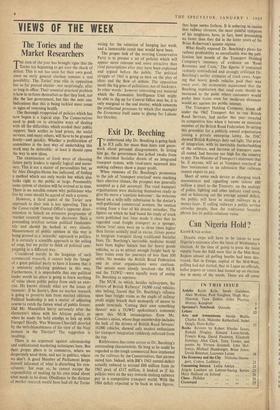VIEWS OF THE WEEK
The Tories and the Market Researchers
THE turn of the year has brought signs that the Tories are beginning to get over the shock of defeat. This is not too soon for their own good,
since an early general election remains a real possibility. The Tories' true role in opposition
has so far proved elusive—not surprisingly, after
so long in office. Their essential practical problem is how to re-form themselves so that they look, not like the last government, but like the next one. Indications that this is being tackled must count as signs of returning health.
The thorough reappraisal of policies which has now begun is a logical step. The Conservatives need to push on to attractive ways of dealing with all the difficulties which eroded their public support. Such nettles as land prices, the social services, and many others, will have to be grasped firmly—and quickly. Whether a proliferation of committees is the best way of undertaking this work may be debatable : at least it should open the way to new ideas.
The examination of fresh ways of choosing future party leaders is equally logical and neces- sary. This is not a matter of personalities but, as Sir Alec Douglas-Home has indicated, of finding a method which not only works but which also looks right to the public at large. Presumably some system of election will be arrived at in time. There is no sensible reason why politicians who live by votes should be scared of such a system.
However, a third aspect of the Tories' new approach to their task is less appealing. This is the Conservative Central Office's apparent deter- mination to launch an extensive programme of 'market research' among the electorate. Such 'a proceeding involves certain political fundamen- tals and should be looked at very closely. Measurement of public opinion in this way is being praised as a 'scientific' approach to politics. It is certainly a scientific approach to the selling of soap, but we prefer to think of political cam- paigning in a different way.
Considered merely in the language of such commercial research, it cannot help the 'image' of a great political party to have it known that it is anxiously soliciting guidance in this way. Furthermore, it is improbable that any political leader worth his place is going to learn anything of value about public policy from such an exer- cise. He knows. already what are the issues of moment: if he doesn't, then no market research is going to preserve him from merited oblivion. Political leadership is not a matter of adjusting course to catch the fairest wind of public favour. Did Mr. Macmillan hurry nervously after the electorate's whim with his African policy, or when he made the bold attempt to link up with Europe? Hardly. Was Winston Churchill diverted by the unfashionableness of his view of the Nazi menace in the Thirties? The suggestion is insulting.
There is no argument against salesmanship and sophisticated marketing techniques here. But their, proper place is in commerce, where we desperately need them, and not in politics, where we don't. A good Member of Parliament keeps himself informed of what is disturbing his con- stituents: but esen so, he cannot escape the responsibility of making up his own mind about what needs to be done. Obedience to the dictates of market research would have had all the Tories
voting for the retention of hanging last week, and a lamentable result that would have been.
The proper task of the reviving Conservative Party is to present a set of policies which will appear more relevant and more attractive than rival prescriptions after they have been explained and argued before the public. The political struggle of 1965 is going to turn on the play of ideas and the flow of debate. The opposition needs the big guns of politicians, not of hucksters. In other words: however interesting any material which the Economist Intelligence Unit might be able to dig up for Central Office may be, it is only marginal to the real matter, which concerns the intellectual processes by which (for example) the Economist itself came to plump for Labour last October.






























 Previous page
Previous page